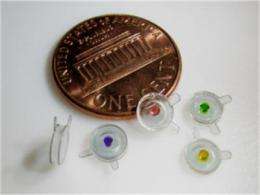Miniature pressure sensors for medical touch

A new kind of flexible, transparent pressure sensor, developed at the University of California, Davis, for use in medical applications, relies on a drop of liquid.
The droplet goes in a flexible sandwich of the substance polydimethylsiloxane, or PDMS. The sensor acts as a variable electrical capacitor. When the sensor is pressed down, the sensing droplet is squeezed over conductive electrodes, increasing its capacitance.
"There's a huge need for flexible sensors in biosensing," said Professor Tingrui Pan, who led the research project.
He and his colleagues used the sensor successfully in measuring the pulse in the human neck. The sensor also could be used in "smart gloves," giving physicians an enhanced ability to measure the firmness of tissues and detect tumors, and in "smart contact lenses," to monitor intraocular pressure without affecting vision.
Pan's research paper — for which graduate students Baoqing Nie and Siyuan Xing and ophthalmology professor James Brandt served as co-authors — appeared in the December issue of the journal Lab on a Chip.
Provided by University of California - Davis



















